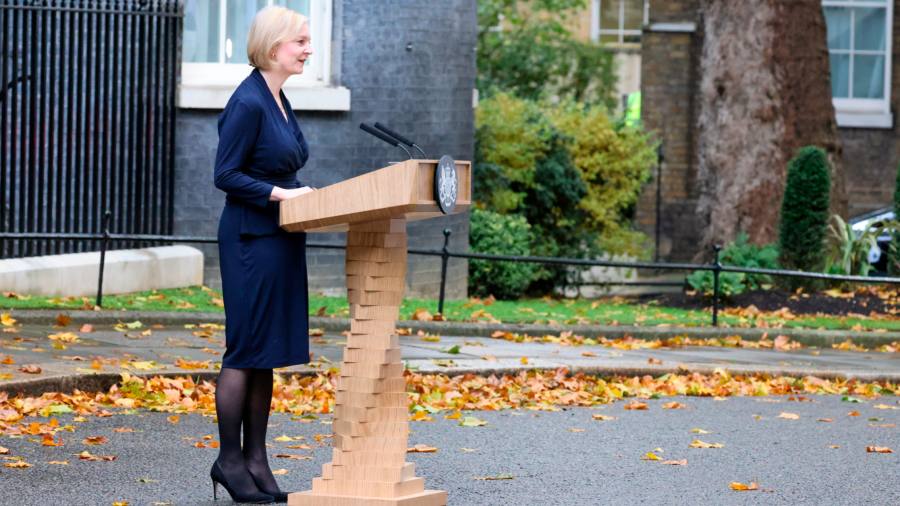
By the end of October, the UK will have had three prime ministers in eight weeks, two of whom have come to power without a general election. The six short weeks of Liz Truss’s premiership trashed not only the UK’s economic standing but also its reputation for political stability. No one, bar a few thousand party members, voted for that. Even they, presumably, did not vote for the destruction of the Conservatives’ reputation for fiscal responsibility and institutional stewardship. The prospect of yet another Conservative prime minister chosen without a general election ignores not only the UK’s growing democratic deficit but also the lack of competence displayed by its woeful government.
Truss could do little else but resign on Thursday, making her Britain’s shortest-serving prime minister in history. Since last month’s disastrous “mini” Budget unleashed market chaos, she has been in office but not in power: what was left of her authority was further eroded by her removal of her chancellor, Kwasi Kwarteng, then the resignation of the home secretary, Suella Braverman. It was laughable to suggest that Truss could successfully lead her party into the next election. Yet the idea that the party now has a week to choose another leader — and therefore prime minister — is absurd, particularly when the new chancellor, Jeremy Hunt (in office all of six days) is set to present a desperately needed fiscal statement on October 31.
That statement is being brought forward precisely to soothe markets that were so spooked by the £45bn of unfunded tax cuts promised by Kwarteng that prompted a liquidity crisis for pension funds, unprecedented emergency intervention by the Bank of England and made it harder and more expensive to secure a mortgage. This financial hand-grenade has alienated the party’s natural base of support in the form of businesses, homeowners and fiscal conservatives. Hunt, who has said he will not run for leadership, has promised to do what he can to repair the damage. But he is looking at a £40bn hole at a time of soaring inflation. Whoever the party chooses as leader should retain Hunt as chancellor, or at the very least keep the programme that he has laid out.
But it was not just the “mini” Budget itself that dispatched Trussonomics, and eventually her premiership. It was also the way she and Kwarteng ran roughshod over institutions such as the Office for Budget Responsibility, the central bank and the civil service; institutions that exist to protect and check the government. Ironically, the “orthodoxy” that she railed against looks to emerge strengthened from this sorry episode.
If the premiership of Boris Johnson (whose comeback would be farcical) was ultimately brought down by his refusal to accept accountability in the political arena, his successor’s demise has been secured by her rejection of institutional checks and balances in the economic one. The government cannot be surprised that if the UK appears to act like an emerging market with chaotic governance, investors treat it like one.
The Tory party has shown itself inept, riven with factionalism, contemptuous of the rule of law and exhausted of credible economic ideas. The only thing that unites Conservatives MPs is the fear of a general election. It is a well-founded concern, given the damage wrought by the past two governments is showing starkly in the polls. But the Conservatives should not be allowed to continue without a new mandate from voters. The British people, not MPs or the 170,000 members of the Conservative party, must now choose their political future.